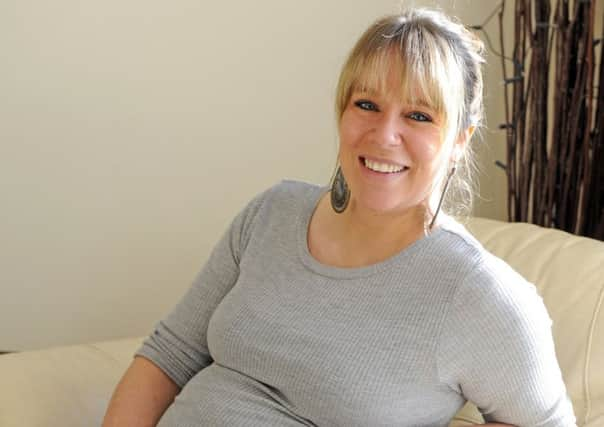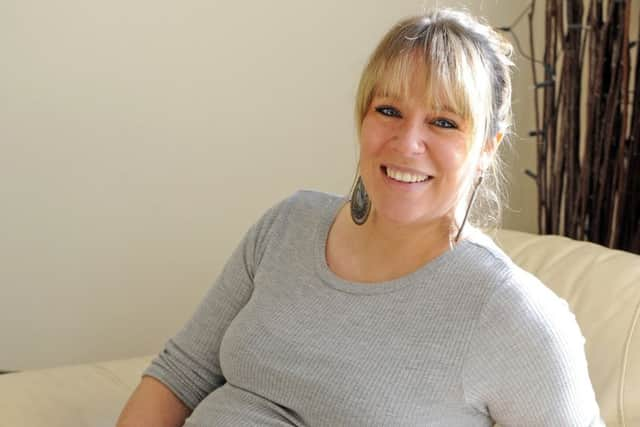Mum-to-be Lauren urges: '˜Have your smear test - it saved my life'
This article contains affiliate links. We may earn a small commission on items purchased through this article, but that does not affect our editorial judgement.


In 2013, the then 26-year-old had ignored a letter from her GP inviting her for the cervical screening test.
When she did finally agree to have it done a year later, the results came back saying she had abnormalities and further tests showed she had stage one cervical cancer.
Advertisement
Hide AdAdvertisement
Hide AdFortunately for Lauren, 30, an operation removed the cancerous cells and she did not need further treatment which might have included radiotherapy, chemotherapy or a hysterectomy – which would have seen her uterus removed.


Now, four years after being told she was cancer-free, Lauren is looking forward to welcoming her first child.
She is sharing her story as today marks the beginning of Cervical Cancer Awareness Week.
Lauren, from Cosham, said: ‘One of the ways to treat cervical cancer is with a hysterectomy.
Advertisement
Hide AdAdvertisement
Hide Ad‘To be told at the very beginning I might not be able to have children depending on how severe the cancer was and to be where I am now, ready to be induced and have my first baby, is amazing.


‘It puts it all into perspective when you are diagnosed with cancer. We are so excited to be parents.’
Since Lauren was diagnosed with cervical cancer, she has been using her story to encourage women to have a smear test when they are first invited to by their GP.
It comes as Portsmouth, Havant, Fareham and Gosport, along with other areas in the south, have some of the worst uptake figures for women having the screening.
Advertisement
Hide AdAdvertisement
Hide AdCervical cancer is the most common cancer in women under 35, but latest data from NHS England showed in March 2017 an average of just 72 per cent of women aged 25 to 64 in the Portsmouth area had the screening.
Lauren said: ‘When I got invited for my first smear test when I was 25 I didn’t really know what it was for or how important it was. Now, for me it is more about talking to people about it and making women feel more comfortable.
‘I guess because of the area of the body it involves, women feel awkward talking about it, but it only takes a few minutes to have the test.
‘I know girls who in their friendship group decide to have it done on the same day so they are all in the same situation.
Advertisement
Hide AdAdvertisement
Hide Ad‘If women are more aware of it and know what happens, I think it will encourage more of them to have it. It saved my life and can save others.’
Being diagnosed with cancer changed Lauren’s outlook on life, making her more driven in her career and in helping others.
She added: ‘After I was given the all-clear I went for a job I never thought I’d get.
‘Now I am managing 70 people after working my way up.
‘It made me just want to go for things and to help other people achieve all they can.
Advertisement
Hide AdAdvertisement
Hide Ad‘I do mentoring and coaching to give people more confidence, especially women.’
Lauren has set up a Facebook page sharing her story and key messages. Visit facebook.com/missldevries.
SURGEON WELCOMES CAMPAIGN
THE theme for this year’s Cervical Cancer Awareness Week is Reduce Your Risk, advising women on the steps they can take to minimise the chances of getting cervical cancer.
Jo’s Cervical Cancer Trust, which supports the national campaign, has listed ways women can reduce the risk, from having smear tests to having the HPV vaccine when they are teenagers.
Advertisement
Hide AdAdvertisement
Hide AdThe charity will today be launching its #SmearForSmear campaign, which encourages women to post a picture of them smearing their lipstick and posting it on social media.
Dirk Brinkmann, consultant gynaecologist and cancer surgeon at Spire Portsmouth Hospital in Havant, welcomed the campaign and awareness week. He said: ‘The single biggest risk factor for developing cervical cancer is not being regularly screened.
‘It is a preventable disease. The signs that it may develop can often be spotted early and it can be treated before it even fully starts.’
Women aged 25 to 49 are invited to attend cervical screening, or smear tests, every three years; those aged 50 to 64 are invited every five years.
Advertisement
Hide AdAdvertisement
Hide AdMr Brinkmann added: ‘It is important to get the message across that cervical screening is not a test for cancer, but instead allows for the detection of abnormalities at an early pre-cancerous stage.
‘The routine of attending for cervical screening should be an important part of every woman’s health regime, but for many women this message just isn’t getting through.
‘Early detection is key to increasing survival rates so educating everyone about the disease, its symptoms and ways to prevent it is very important.’
For details on the #SmearForSmear campaign visit jostrust.org.uk.
LOW UPTAKE
Advertisement
Hide AdAdvertisement
Hide AdWOMEN aged 25 to 29 have the lowest uptake for going for their smear tests.
Nationally, the number of women having the cervical screening is the lowest it has been for 20 years.
And statistics from NHS England show, as of March 2017, women aged 25 to 29 being screened for cervical cancer is the lowest in any age group and numbers attending for screening are falling year on year.
Dr Liz Mearns, medical director based in NHS England’s south regional office, said: ‘We have noticed a fall in attendance of younger women over the past few years, and are concerned that this trend may increase due to misunderstanding of the level of protection that the HPV vaccination offers.
Advertisement
Hide AdAdvertisement
Hide Ad‘The first girls who were vaccinated against HPV are now eligible for screening as they reach their 25th birthday.
‘Although they are protected against the two most common HPV types that cause 70 per cent of cervical cancers, the risk is not completely eliminated and screening is still an important part of preventing cancer.’
Every day nine women in the UK are diagnosed with cervical cancer and two will lose their lives to the disease.
Cervical cancer is the most common cancer in women under 35, but is largely preventable thanks to cervical screening and the HPV vaccination programme.
Advertisement
Hide AdAdvertisement
Hide AdSurveys undertaken by cancer charities indicate embarrassment and a lack of understanding of the causes of cervical cancer may be behind the fall in numbers attending.
NHS England and Public Health England are supporting Cervical Cancer Awareness Week, which runs from today.
It aims to raise awareness of the importance of cervical screening and its role in preventing cancer, as well as encouraging women to go for their screening test when invited.
Dr Mearns added: ‘It is really important for women to understand the importance of attending cervical screening when they receive a letter from their GP.
‘These can detect pre-cancer abnormalities, which, if left untreated, may develop into cancer.’